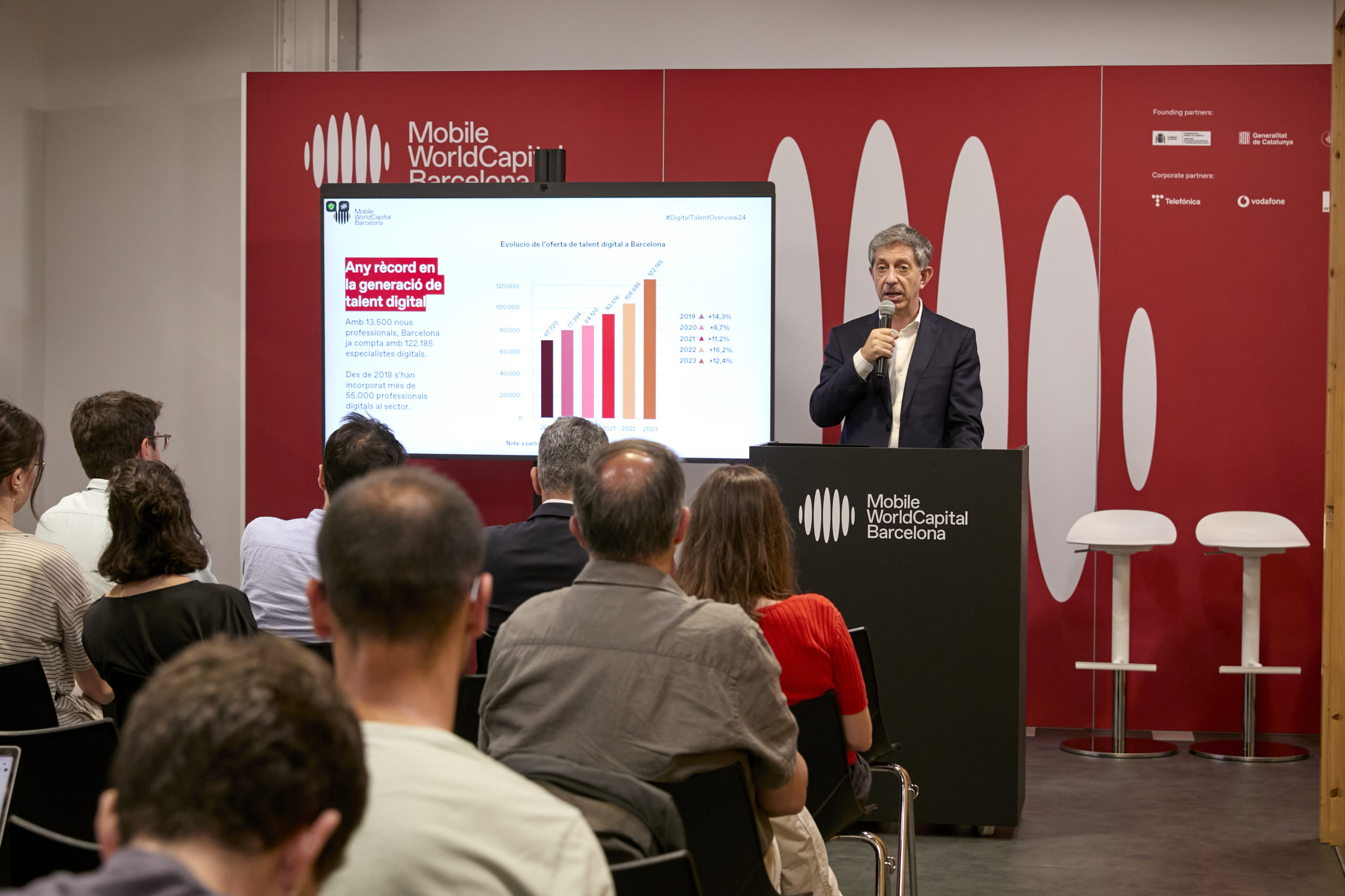- Last year, the city added 13,500 new specialists with a technological profile, more than a third of them from outside Catalonia, according to the Digital Talent Overview report prepared by Mobile World Capital Barcelona.
- The gender gap continues to narrow: Barcelona has 35,000 women who work in digital careers, 30.6% of the total in the sector.
- Blockchain (+58%), Cloud (+20%), and Artificial Intelligence (+12%) are the sectors where the demand for professionals is growing the most.
- Emerging technologies such as NewSpace, Semiconductors, or Quantum are increasingly present and generate new professions: from space data analysts to chip engineers, satellite designers, or quantum meteorologists

June 7, 2024
Barcelona has 122,185 digital professionals, 12.4% more than a year ago, consolidating its position as one of the main hubs in Europe. This is one of the conclusions of the 6th Digital Talent Overview, the report prepared by Mobile World Capital Barcelona that analyzes the situation and evolution of digital talent in Europe, Catalonia, and Barcelona.
The results of the report were presented today by the CEO of MWCapital, Francesc Fajula, and the Director of Corporate Development and Head of the Digital Talent area of MWCapital, Jordi Arrufí, in an appearance that also addressed the impact that emerging technologies such as Quantum Computing, NewSpace or Semiconductors are having on the labor market.
Record year for new digital professionals
“In 2023, with the arrival of 13,500 new professionals, the record for the incorporation of digital talent was broken,” said Francesc Fajula. Among these new professionals, 5,111 are specialists from outside Catalonia, while the rest come from university bachelor’s and master’s degrees taught in the Barcelona region (2,958), ICT vocational training cycles (4,100), and other digital studies (1,331). Overall, since 2018 the availability of digital talent in Barcelona has grown by almost 55,000 professionals.
Fajula also highlighted that “this reality means that 3 out of 10 job offers in Barcelona are digital, which places the city in the top 3 at European level”. Specifically, the Catalan capital is in third position in terms of digital offers published with respect to the total, with 29.46%, only behind London (31.64%) and Amsterdam (30.08%), and above the European average (25.07%).
In terms of demand for digital talent, in 2023, 34,192 job offers were published for ICT profiles in Barcelona: a figure that, although it doubles that of five years ago, is 13% lower than the figure in 2022. While the city’s technology hubs continued to increase the demand for professionals (+37%), start-ups – conditioned by the lower contribution of venture capital funds – offered 34% fewer vacancies, according to the report.
The combination of a higher number of available professionals and a lower volume of job offers has slightly de-stressed the digital labour market. However, compared to other sectors, the scarcity of digital profiles is still the norm: if in the set of professions, there is a ratio of 70 professionals for each job offer, in the ICT sector the proportion is 14.2, five times less.
Blockchain, Cloud, and AI: the emerging markets with the most demand
Data from the Digital Talent Overview shows the momentum that emerging technologies are generating in the labour market. Jobs related to Blockchain (+58%), Cloud (+20%), and Artificial Intelligence (+12%) are the ones that are growing the most, while NewSpace, Quantum, microprocessors, or Sustainable Computing are beginning to make a place for themselves in the labor market, although still with modest figures.
Web and App developers were the most in-demand profiles, while, on the other side of the scale, vacancies for 3D printing fell by about 60%. The area with the highest shortage of profiles is Cybersecurity: on average, for every job offer, there are only 3 professionals.
1 in 3 digital professionals are women
Barcelona has almost 35,000 women who work in digital professions, 30.6% of the total for the sector. Although it is still far from parity, in the last five years this figure has increased by almost eight points (it was 22% in 2018) and is in line with the average of the main European hubs, where the presence of female digital talent has improved slightly and represents 30.3%. The most feminized ICT professions are Digital Marketing (57%) and User Experience (45%), while Cybersecurity (16%) and Blockchain (18%) are the areas with the least representation.
The Spanish city that offers the highest salaries
The average salary for digital professionals in Barcelona stands at €47,771 gross per year, 1.8% more than in 2022. This increase represents a moderation in wage inflation, after years of double-digit increases. However, the ICT field continues to pay well above the average salary in the city (€33,837). Cybersecurity (€57,200), NewSpace (€54,900), and Artificial Intelligence (€54,600) are the disciplines that best remunerate their professionals.
In Spain, the average salary of digital professionals is €38,780 per year, with Barcelona as the city that offers the highest pay, followed by Madrid (€44,366). However, when wages are adjusted to the cost of living, there are significant changes in the positions of cities. At the European level, the average normalised salary in Barcelona (€47,771) is close to a group of cities such as Paris (€52,703), London (€49,990), or Dublin (€49,601), where the cost of living is higher.
Emerging technologies create new careers
NewSpace, Quantum, and Semiconductors are three technological fields in full expansion, and this edition of the Digital Talent Overview analyzes each of them qualitatively to identify their trends and the new professional profiles they demand.
Semiconductors are the basis of any digital and connected device, such as mobile phones and computers, and a booming sector that employs 998 specialists in Catalonia. The sector expects annual growth of 6.3% until 2027.
Another sector with great projection in Catalonia is NewSpace, with projects in areas such as micro-launchers, small satellites, or the processing of space data. The ‘democratisation’ of space, until now dominated by a few countries, is generating new professions: from engineers capable of designing, building and programming satellites, to developers of the software to control them, to space data analysts or specialists in cartography and precision agriculture. These profiles are essential to sustain the 11% annual growth expected by the sector until 2030.
Although it is still in its infancy, Quantum Computing is emerging as one of the next great technological and also labor revolutions. Its emergence will require designers of encrypted communication networks, developers of quantum software, and specialists in the simulation of quantum systems or sensors, such as researchers in quantum meteorology.
Stay up to date about everything
Subscribe to stay up to date with the latest content from Mobile World Capital Barcelona.
